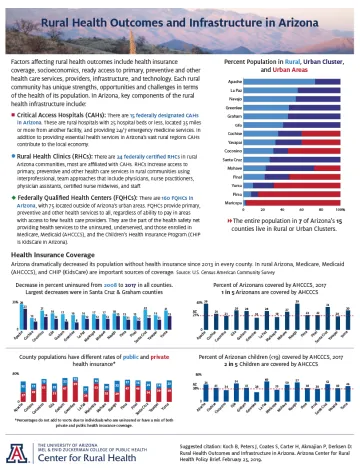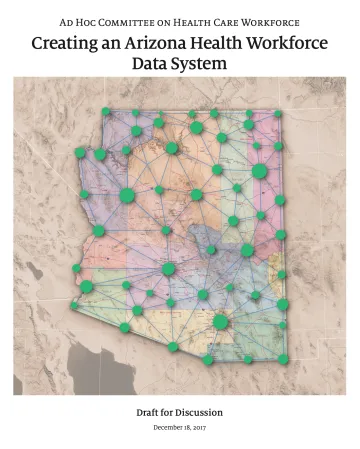AzCRH Policy Reports & Briefs
Graduate Medical Education (GME) in Arizona
September 2025 - Authors: D Derksen, B Koch, A Garn, L Barraza, L Erdelyi
Population growth, an aging population, and an increase in the number of insured Arizonans contribute to rising demand for health care services.
Increasing GME positions in Arizona to account for population growth, expanded health insurance coverage and increasing enrollment in undergraduate medical education (MD, DO) will strengthen pathways to practice for the physician workforce in Arizona.
Arizona Rural Maternity Care
May 2025 - Authors: B Koch, S Coates, A Garn, E McMahon, D Derksen
The United States has the highest maternal mortality rate (maternal death during pregnancy, childbirth or within 42 days after delivery) compared to similar countries.
Arizona’s maternal mortality rate worsened from 2016-17 to 2018-19. The rate was worse in rural counties compared to urban counties in Arizona. Addressing health insurance coverage and access to obstetric and postpartum care in rural Arizona is a priority.
Quantifying Arizona’s Primary Care Shortage Using Health Professional Shortage Area (HPSA) Data
December 2024 - Authors: Koch B, Drake, C, Garn, A. and Derksen, D
The purpose of this brief is to summarize the Full-Time-Equivalent (FTE) shortage of primary care physicians (PCPs) by county and tribal area in Arizona. The brief uses Health Resources and Services Administration (HRSA) Health Professional Shortage Area (HPSA) data to summarize the PCP FTE shortage and the number of facilities with a HPSA designation.
Arizona Graduate Medical Education (GME) Update
December 2023 - Authors: D Derksen
The need is clear. As one of the top 10 fastest growing states, Arizona must grow the healthcare workforce. Dive deeper into Arizona Undergraduate and Graduate Medical Education (UME, GME) Update.
Timeline: Developing Arizona Healthcare Workforce Minimum Data Set (MDS)
March 2023 - Authors: D Derksen, B Koch, A Garn
Since 2017, Arizona healthcare stakeholders have collaborated to support the development of a system to provide timely, accurate, and standardized data about the healthcare workforce in our state, a minimum data set (MDS). Data on the healthcare workforce, including their primary work location, clinical hours, plans for retirement etc. is more important than ever as we observe the impacts and consequences of the COVID-19 pandemic on healthcare workers.
Arizona's Physician Shortage: Monitoring Rural Physician Retention and Relocation
June 2021 - Authors: D Gulick, B Brady, B Koch
Arizona has a shortage of primary care physicians and will require an additional 1,941 by 2030 due to population increases, higher rates of chronic disease, and aging. Physician supply is also unevenly distributed between rural and urban areas within the state, and these disparities are growing. This brief reviews indicators of physician workforce capacity and presents recommendations for accurately predicting future physician supply and demand to ensure Arizonans meet their healthcare needs in the future.
Information & Research about Overdose and Disease Prevention Programs
February 2020 - Authors: B Koch, B Brady, D Derksen, A Padilla
Many states have adopted evidence-based harm reductions programs to prevent and reduce substance use disorder and human immunodeficiency virus (HIV) and hepatitis C virus (HCV) infections. These programs can offer needed resources in areas where there is limited access to behavioral health care services. Suggested citation: Koch B, Brady B, Padilla A, and Derksen D. (2020). Information and Research about Overdose and Disease Prevention Programs. Arizona Center for Rural Health Policy Brief.
Improving Detection to Reduce Infection
April 2013 - Authors: Benjamin Brady
Many state and federal funding agencies mandate SSI Surveillance.The Centers for Medicare and Medicaid Services (CMS) inpatient reporting program, for example, requires 30 day, post-discharge surveillance.9 For many hospitals, surveillance is an unavoidable cost. If done well, however, the cost of treating an SSI is an avoidable cost.



